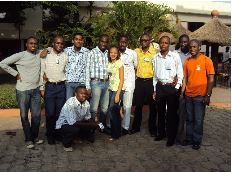The Technical Centre for Agriculture and Rural development (CTA) went a step further in its commitment to capacity building and knowledge sharing amongst young agriculture enthusiasts and youth in related professions, in the ACP region, as it organised a Youth Exchange and Training Workshop on Web 2.0 for Agricultural and Rural Development in partnership with the Institute for Scientific and Technological Information (CSIR – INSTI) of Ghana. I had the honour of being the only participant from the Pacific.
This workshop, which was organized in the framework of the ARDYIS (Agriculture, Rural Development and Youth in the Information Society) project, aimed to train selected best participants of the ARDYIS essay contest organized in 2010 in advanced web 2.0 tools and to support networking among youth involved in the project. Participants came from 17 ACP countries.
The event was held in Accra, Ghana, from 7 to 11 March 2011 and had two components - a training workshop (4 days) on selected Web2.0 tools and an exchange meeting (1 day) on the challenges and opportunities of agriculture for youth in the information society.
The training agenda covered an introduction on web 2.0 for development, RSS tools, collaborating remotely using wikis, Google Docs, Google Maps, Drop box, producing content on Wikipedia, online mapping and advanced social networking tools (namely on Facebook, blogger, twitter, and ping). For the exchange meeting, discussions were articulated via interactive sessions, with demonstration of experiences of youth involved in the project and presentations by resourceful experts.
At the conclusion of the workshop on March 11th, after rugged discussions and debates, the youth participants developed a communiqué to voice their concerns to relevant organizations, statuary bodies and policy makers. Below is the original version of the communiqué to be distributed to leaders and politicians throughout ACP…
Nearly 30 of us, young agricultural development workers, emerging researchers and university students, representing 17 African, Caribbean and Pacific countries were engaged in robust discussions on agricultural policies and their impact on youth participation in the sector, as well as learning and sharing knowledge about how to use various new media tools to enhance work in the field of agriculture.
We were brought together by the “Agriculture, Rural Development and Youth in the Information Society” (ARDYIS) initiative, implemented by the Technical Centre for Agriculture and Rural Cooperation ACP-EU (CTA) in collaboration with several partners. We participated in the Youth Exchange and Training Workshop on Web 2.0 for Agricultural and Rural Development in Accra, Ghana from March 7 to 11. Our vibrant, multilingual and practical discussions and skills boosting workshop was organized in partnership with the Institute for Scientific and Technological Information (CSIR – INSTI) of Ghana. We are energized and prepared to share our newly acquired and boosted skills in advanced web 2.0 tools and to support networking among youth involved in agriculture and rural development in our home countries.
We strongly believe that our novel and strategic technological use, ingenious nature, enthusiasm and demonstrable successes must be substantially matched by equally thoughtful, dynamic multilevel and relevant agricultural policies across the ACP group of countries. We recognize that the situation varies across the ACP group, but the reality is similar in key respects. In many ACP countries agriculture accounts for upwards of 50% of gross national product and youth, irrespective of how it’s defined, constitutes a large portion of the citizenry. In Africa, more than 60% of the population is engaged in agriculture. Yet, youth involvement in the sector remains astonishingly low, while unemployment among our peers remains consistently high across the ACP block.
Recalling the renewed international recognition of the importance of agriculture for our countries, we urge ACP governments and institutions to aid us in addressing this key developmental problem, notably by engaging us in a meaningful dialogue around the following policy recommendations:
Agricultural Studies
Recommendation 1: A thorough revision of the curricula used across the ACP group of countries. This MUST reflect the dynamism of the agricultural sector by including courses and modules that equip students with the skills to write and implement business plans, appreciate, utilize and develop ICT tools.
The absence of agriculture from the curriculum, particularly at the compulsory levels of education in some ACP countries is untenable. The current mode of education in most developing countries is geared towards educating white collar workers, which doesn’t reflect the economic and social context for which we are being trained. This is not to suggest that ACP countries shouldn’t plan for economic expansion, however those plans should not negate the existing needs of the economy. One response is to encourage partnerships with the education sector to integrate agriculture into the primary and secondary school curriculum meaningfully. In many instances, agriculture is incorporated as an optional component that is taught with minimal enthusiasm; its broad based and compulsory inclusion with the appropriate resources will help to motivate youth towards having a more favourable view of employment opportunities in the agricultural sector.
Research and Educational Incentives
Recommendation 2: The Provision of a mixture of favourable scholarships, tuition grants and concessionary education and research loans to those under age 35 who are keen to pursue studies in critical areas of agricultural and rural development, such as agronomy, agricultural extension biotechnology, food science and technology, agricultural engineering, agricultural chemistry and water management.
The current university structure in most ACP countries favours the Arts and Social Sciences, sectors for which our economies are expanding too slowly to provide enough employment opportunities. This should be complemented with improved learning facilities.
Capacity Building
Recommendation 3: Fund and pilot a robust peer-extension, localized training on good agricultural practices, agro-processing and an ICT officer program to aid young and emerging farmers master their trade and boost capacity in far-flung regions and urban areas alike. This may also be integrated into national youth service programmes. We also advocate greater resources for researchers at universities in ACP countries who are focused on unearthing solutions to agricultural challenges.
Our collective experience shows that a critical mass of young people in ACP countries are interested in pursuing careers in the field of agriculture, but they are hamstrung by limited skills, knowledge and training opportunities. Resolving these intractable problems requires urgent attention. ACP economies are bound to benefit immensely given the need to reduce food imports.
Financial Aid
Recommendation 4: Create a legible, collateral free micro-credit environment that offers incentives tailored to the financial needs of young farmers, and ICT software developers who are focused on rural development and agriculture. In the short term, we also call on ACP governments to allocate funds (loans and grants) specifically for young farmers and ICT software developers.
ICT Proliferation
Recommendation 5: The establishment of regional ICT incubators over the next five years to develop contextual and efficient technological responses to agricultural problems. This should complement the process of decentralization which we urge ACP policy makers to accelerate immediately. Central to this effort is an emphasis on training to boost the capacity of farmers and trainers to ensure the effective application of ICTs in the sector.
There is relatively limited use of ICTs in the agricultural sector across the ACP region. The adoption of ICTs and other new technologies in agriculture is highly dependent on the quality of the trainers, who are usually extension agents. The training of a cadre of highly proficient extension agents is crucial for the successful implementation of the recommendation above. This will require improvements in communications and transport infrastructure.
The Law, Gender and Marginalized Youth
Recommendation 6: The provision of legal structures to facilitate enhanced participation of the youth in ICT, particularly women, physically challenged youth and marginalized youth with the required skills and interest is vital. We forthrightly endorse the prioritization of these groups in land reform programmes. We also urge ACP countries to meaningfully institutionalize youth involvement in agricultural policy making, giving full consideration to the varying needs of men and women and the different demands they face.
Access to resources in developing countries is often screwed towards groups that exclude young people, especially women and youngsters from marginalized communities. This is exacerbated by the limited legal structures to guarantee equal opportunities for young people, particularly women and youngsters from marginalized backgrounds. The development of ACP countries hinges on creating equitable opportunities for all backed by firm and clear laws.
We acknowledge that the recommendations that we have made are not sufficient to redress the full scope of challenges faced by budding farmers in ACP countries. Nonetheless, these six key policy endorsements are essential to any effort that will aid us in altering the unsavoury image and diverse challenges in the agricultural sector in the ACP group. We are eager to continue the dialogue with interested parties-policy makers, activists, young farmers, researchers and all those who share our cause.
Let’s make ACP countries a tenable place for us to live, learn, work, develop and call home! In accordance with an African Union head’s recent statement, we want to say “Let’s start feeding the ACP through new technologies: LET US ACT NOW!”
Accra, 11 March 2011
Signed:
Young participants
Umeasiegbu Nonyelum Sandra (Nigeria) - Anthony Itodo Samuel (Nigeria) - Tia Moses Nganwani (Ghana) - Christie Samantha-Kaye Denise (Jamaïca) - Chanda Isaac (Zambia) – Kenosi Loeto Ronald (Botswana) - Hosenally Bibi Nawsheen (Mauritius) - Gondwe Sangwani Rebeccah (Malawi) - Haynes Jason (Saint Vincent and the Grenadines) - George Marcus (Trinidad and Tobago) - Gosai Riten Chand (Fiji Island) – Menzies Gaynelle (Jamaïca) - Hall Tyrone Christopher (Jamaïca) - Moot Dennis (Ghana) - Ngige Chris Mwangi (Kenya) - Zvavanyange Raymond Erick (Zimbabwe) – Mangena Gerald Musakaruka (Zimbabwe) - Adaha Zodigbé Aristide (Benin) - Dacko Goudjo Gabriel (Cameroon) - Traore Inoussa (Burkina Faso) - Wilson Gitau Karuga (Kenya) - Diouf Moustapha Waly (Sénégal) - N'Dépo Akaffou Euphrem (Côte d'Ivoire) – Makau Caroline Mwende (Kenya)
Other stakeholders present who endorse the Call
Martine Koopman (International Institute for Communication and Development - IICD) - John Stephen Agbenyo (SavSign, Ghana) - Koffi Akoutse (ONG École et vie; Togo) - Martin Bosompem (Young Professionals’ Platform for Agricultural research for Development - YPARD) - Technical Centre For Agricultural and Rural Cooperation (CTA), Institute for Scientific and Technological Information (CSIR – INSTI).
ARDYIS is implemented in partnership with an Advisory Committee that includes: Forum for Agricultural Research in Africa (FARA), African Network for Agriculture, Agroforestry and Natural Resources Education (ANAFE), Pacific Agriculture and Forestry Policy Network (SPC/PAFPNet), Caribbean Farmers’ Network (CAFAN), Yam-Pukri association, African Youth Foundation (AYF).
By: Riten Chand Gosai (Pacific Youth Representative - Recent Graduate, University of the South Pacific, Alafua Campus)
The Secretariat of the Pacific Community (SPC), Land Resources Division (LRD) will be working closely with CTA to look at doing a similar initiative on web 2.0 with SPC stakeholders in the Pacific.





CONNECT WITH US